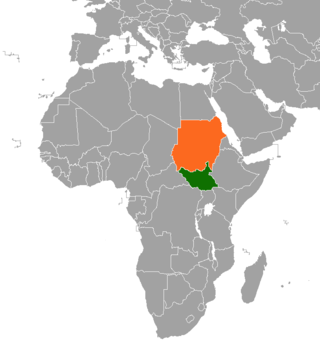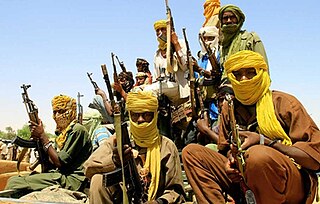| |||||
| Decades: | |||||
|---|---|---|---|---|---|
| See also: | |||||
The following lists events that happened during 2014 in the Republic of South Sudan .
| |||||
| Decades: | |||||
|---|---|---|---|---|---|
| See also: | |||||
The following lists events that happened during 2014 in the Republic of South Sudan .

The Kakwa are an ethnic group primarily found in the border regions of northwestern Uganda, southwestern South Sudan, and northeastern Democratic Republic of the Congo. They are part of the larger Nilo-Saharan language family, and their traditional homeland spans across these three countries, reflecting both historical and cultural ties in the region.

Omar Hassan Ahmad al-Bashir is a Sudanese former military officer and politician who served as Sudan's head of state under various titles from 1989 until 2019, when he was deposed in a coup d'état. He was subsequently incarcerated, tried and convicted on multiple corruption charges. He came to power in 1989 when, as a brigadier general in the Sudanese Army, he led a group of officers in a military coup that ousted the democratically elected government of prime minister Sadiq al-Mahdi after it began negotiations with rebels in the south; he subsequently replaced President Ahmed al-Mirghani as head of state. He was elected three times as president in elections that have been under scrutiny for electoral fraud. In 1992, al-Bashir founded the National Congress Party, which remained the dominant political party in the country until 2019. In March 2009, al-Bashir became the first sitting head of state to be indicted by the International Criminal Court (ICC), for allegedly directing a campaign of mass killing, rape, and pillage against civilians in Darfur. On 11 February 2020, the Government of Sudan announced that it had agreed to hand over al-Bashir to the ICC for trial.

This article covers the period of the history of Sudan between 1985 and 2019 when the Sudanese Defense Minister Abdel Rahman Swar al-Dahab seized power from Sudanese President Gaafar Nimeiry in the 1985 Sudanese coup d'état. Not long after, Lieutenant General Omar al-Bashir, backed by an Islamist political party, the National Islamic Front, overthrew the short lived government in a coup in 1989 where he ruled as President until his fall in April 2019. During Bashir's rule, also referred to as Bashirist Sudan, or as they called themselves the al-Ingaz regime, he was re-elected three times while overseeing the independence of South Sudan in 2011. His regime was criticized for human rights abuses, atrocities and genocide in Darfur and allegations of harboring and supporting terrorist groups in the region while being subjected to United Nations sanctions beginning in 1995, resulting in Sudan's isolation as an international pariah.

The War in Darfur, also nicknamed the Land Cruiser War, was a major armed conflict in the Darfur region of Sudan that began in February 2003 when the Sudan Liberation Movement (SLM) and the Justice and Equality Movement (JEM) rebel groups began fighting against the government of Sudan, which they accused of oppressing Darfur's non-Arab population. The government responded to attacks by carrying out a campaign of ethnic cleansing against Darfur's non-Arabs. This resulted in the death of hundreds of thousands of civilians and the indictment of Sudan's president, Omar al-Bashir, for genocide, war crimes, and crimes against humanity by the International Criminal Court.

Libya–United States relations are the bilateral relations between the State of Libya and the United States of America. Relations are today cordial and cooperative, with particularly strong security cooperation only after the 2012 attack on the US liaison office or mission in Benghazi. Furthermore, a Gallup poll conducted in March and April 2012 found that Libyans had "among the highest approval" of US leadership in the entire Middle East and North Africa region.

Sudan–United States relations are the bilateral relations between Sudan and the United States. The United States government has been critical of Sudan's human rights record and has dispatched a strong UN Peacekeeping force to Darfur. Relations between both countries in recent years have greatly improved, with Sudan's post-revolutionary government compensating American victims of al-Qaeda terror attacks, the removal of Sudan from the State Department's blacklist of state sponsors of terrorism and the United States Congress having reinstated Sudan's sovereign immunity in December 2020.
The war was waged for over a quarter of a century, with an estimated 70,000 killed by 2007. Immediately following the end of war, on 20 May 2009, the UN estimated a total of 80,000–100,000 deaths. However, in 2011, referring to the final phase of the war in 2009, the Report of the Secretary-General's Panel of Experts on Accountability in Sri Lanka stated, "A number of credible sources have estimated that there could have been as many as 40,000 civilian deaths." The large majority of these civilian deaths in the final phase of the war were said to have been caused by indiscriminate shelling of a formerly designated 'No Fire Zone' by the Sri Lankan Armed Forces.

Sudanese nomadic conflicts are non-state conflicts between rival nomadic tribes taking place in the territory of Sudan and, since 2011, South Sudan. Conflict between nomadic tribes in Sudan is common, with fights breaking out over scarce resources, including grazing land, cattle and drinking water. Some of the tribes involved in these clashes have been the Messiria, Maalia, Rizeigat and Bani Hussein Arabic tribes inhabiting Darfur and West Kordofan, and the Dinka, Nuer and Murle African ethnic groups inhabiting South Sudan. Conflicts have been fueled by other major wars taking place in the same regions, in particular the Second Sudanese Civil War, the War in Darfur and the Sudanese conflict in South Kordofan and Blue Nile.

The Sudanese conflict in South Kordofan and Blue Nile was an armed conflict and insurgency in the Sudanese states of South Kordofan and Blue Nile between the Sudanese Armed Forces (SAF) and the Sudan People's Liberation Movement–North (SPLM-N), a northern affiliate of the Sudan People's Liberation Movement (SPLM) in South Sudan. After some years of relative calm following the 2005 agreement which ended the second Sudanese civil war between the Sudanese government and SPLM rebels, fighting broke out again in the lead-up to South Sudan independence on 9 July 2011, starting in South Kordofan on 5 June and spreading to the neighboring Blue Nile state in September. SPLM-N, splitting from newly independent SPLM, took up arms against the inclusion of the two southern states in Sudan with no popular consultation and against the lack of democratic elections. The conflict is intertwined with the War in Darfur, since in November 2011 SPLM-N established a loose alliance with Darfuri rebels, called Sudan Revolutionary Front (SRF).

Human rights in South Sudan are a contentious issue, owing at least in part to the country's violent history.
Ethnic violence in South Sudan has a long history among South Sudan's varied ethnic groups. South Sudan has 64 tribes with the largest being the Dinka, who constitute about 35% of the population and predominate in government. The second largest are the Nuers. Conflict is often aggravated among nomadic groups over the issue of cattle and grazing land and is part of the wider Sudanese nomadic conflicts.

The United Nations Mission in South Sudan (UNMISS) is a United Nations peacekeeping mission for South Sudan, which became independent on 9 July 2011. UNMISS was established on 8 July 2011 by United Nations Security Council Resolution 1996 (2011).

The South Sudanese Civil War was a multi-sided civil war in South Sudan fought from 2013 to 2020, between forces of the government and opposition forces. The Civil War caused rampant human rights abuses, including forced displacement, ethnic massacres, and killings of journalists by various parties. Since its end South Sudan has been governed by a coalition formed by leaders of the former warring factions, Salva Kiir Mayardit and Riek Machar. In 2024, the country continues to recover from the war while experiencing ongoing and systemic ethnic violence.
The following are international reactions to the South Sudanese Civil War:

The Rapid Support Forces is a paramilitary force formerly operated by the government of Sudan. The RSF grew out of, and is primarily composed of, the Janjaweed militias which previously fought on behalf of the Sudanese government. Its actions in Darfur were deemed crimes against humanity by Human Rights Watch.

On 26 March 2015, Saudi Arabia, leading a coalition of nine countries from West Asia and North Africa, launched a military intervention in Yemen at the request of Yemeni president Abdrabbuh Mansur Hadi, who had been ousted from the capital, Sanaa, in September 2014 by Houthi insurgents during the Yemeni Civil War. Efforts by the United Nations to facilitate a power sharing arrangement under a new transitional government collapsed, leading to escalating conflict between government forces, Houthi rebels, and other armed groups, which culminated in Hadi fleeing to Saudi Arabia shortly before it began military operations in the country.

The Battle of Juba of 2016 was a series of clashes in South Sudan capital of Juba between rival factions of the Sudan People's Liberation Army (SPLA) loyal to President Salva Kiir and Vice-President Riek Machar respectively.
Events of 2020 in Ethiopia.
The following lists events during 2023 in the Republic of the Sudan.

A civil war between two major rival factions of the military government of Sudan, the Sudanese Armed Forces (SAF) under Abdel Fattah al-Burhan and the paramilitary Rapid Support Forces (RSF) and its allies under the Janjaweed leader Hemedti, began during Ramadan on 15 April 2023. Three minor (neutral) factions have also participated in the fighting: the Darfur Joint Protection Force; the SLM (al-Nur) under Abdul Wahid al-Nur; and the SPLM-N under Abdelaziz al-Hilu. Fighting has been concentrated around the capital city of Khartoum and the Darfur region. As of 14 November 2024, at least 61,000 people had been killed in Khartoum State alone, of which 26,000 were a direct result of the violence. As of 5 July 2024, over 7.7 million were internally displaced and more than 2.1 million others had fled the country as refugees, and many civilians in Darfur have been reported dead as part of the Masalit massacres.